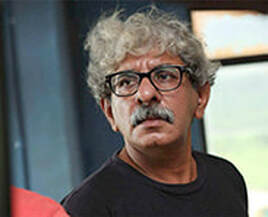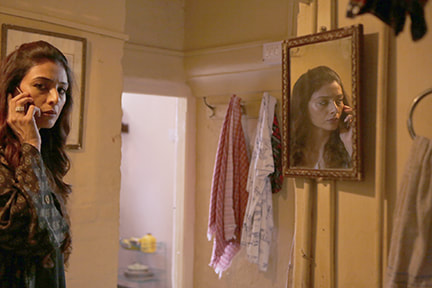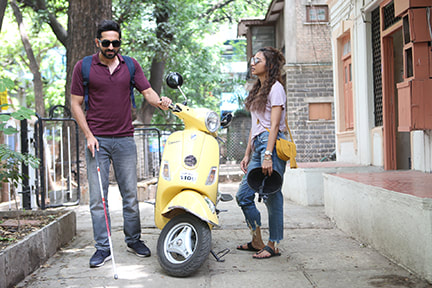Sriram Raghavan is the film director and screen writer known widely for producing a 45-minute docufiction on Indian serial killer Raman Raghav and the 2004 Hindi feature film Ek Hasina Thi produced by Ram Gopal Varma. His second feature film was 2007’s Johnny Gaddar followed by Badlapur. His latest film Andhadhun has been the talk of the town. A must watch thriller, it will play at IFFLA’s opening night on April 11,2019 at Ahrya Fine Arts movie theater in Beverly Hills. Los Angeles.

Q: By winning several Filmfare awards this month, including Critics Award for Best Film, Andhadhun has received validation from audience and critics alike. What does this mean to you?
A: I don’t think any filmmaker thinks of awards and accolades whilst making a film. At that time, the focus is only on trying to tell the story as good and cinematically as possible. Andhadhun was a little film with minimal marketing and a modest release. We got terrific reviews which felt good, but what I definitely didn’t expect is the overwhelming love from audiences. The ending became a talking point. It’s one of the rare cases when the second weekend did more business than the first. It’s the viewers and +ve word of mouth that made it a success. Awards are fine as long as I don’t take it seriously. Awards make parents very happy.
Q: With the success of Johnny Gaddaar and Andhadhun, you have come to be known as the master of twisted tales. Why do mind-bending plots fascinate you so much?
A: I get terrified of hyperboles. There is only one master and he is Sir Alfred Hitchcock. We are all his students. Right from my school days, I was attracted to crime fiction. American hardboiled detective stories, pulp fiction, noir and more. I guess it’s the thrill of vicariously living an adventure in your head. Enjoying a terrifying experience, and thinking, Thank God, it’s not happening to me. Within the thriller genre, there are so many stories and themes one can explore.
Q: In Andhadhun, you lay out the clues and then challenge the audience to put them together to figure out what happened – like a game. How did the idea for this clever film originate? Share with us how some of the unexpected twists developed while working on the story line.
A: Some years back, I saw a terrific 11 minute short film, Le Accordeur. The film ended on a tense note but I found it very funny. We took that as a basic inspiration and decided to work out our own back and forward story. We had no idea what our second and third act would be. We kept trying story lines and rejecting them because they reminded us of some old classic or the other. I love Wait Until Dark, so I said, we should NOT borrow any big ideas from there. No Daredevil ideas either. And so on. Try and eliminate the expected stuff….because the audience is predicting the story too. We were a gang of writers so it was more fun than work. It was a process of free writing and brainstorming. We debated the end like crazy. The blind rabbit came into the story much later. In between we made Badlapur. I can go on and on.
Q: In Badlapur a profound twist/irony occurs -- the hero is ultimately lost to darkness while the villain redeems himself. Do you consciously try to bring such moral issues into your films since most of them are essentially about crime and deceit?
A: We all love revenge stories, mainly for the catharsis in the end. Whether it’s Deathwish or Sholay or Ghayal, we are geared to root for the vengeful hero. BADLAPUR was an anti revenge story. It’s a disturbing tale and makes a point you may or may not agree with. To make the viewer shift allegiance from hero to villain was a challenge. I had superb actors. I was lucky to get such a story.
Q: What should we expect in your next film? Give us a clue.
A: I am working on a drama that’s completely out of my comfort zone. It deals with the 1971 war and is a human story. I am both excited and terrified. Alongside, I am working on a little noir love story. It’s about two strangers who meet one evening and…I am not giving anything more away.
Q: Your Johnny Gaddaar was screened at IFFLA 2007. You are returning next month to IFFLA with Andhadhun, and this time it will be showcased in the prime Opening Night slot. Why are film fests, and especially IFFLA, important for you and your films?
A: I don’t think I make what some term as ‘festival’ films. My films may not be typically ‘commercial’ but they are for mainstream audiences. Festivals of course have tremendous value, showcasing your film to a completely fresh audience. IFFLA is extremely dear to me, because JOHNNY GADDAAR was screened here… my first film at any festival. It gave us a huge high. This time it’s the opening film and that’s an honour.
A: I don’t think any filmmaker thinks of awards and accolades whilst making a film. At that time, the focus is only on trying to tell the story as good and cinematically as possible. Andhadhun was a little film with minimal marketing and a modest release. We got terrific reviews which felt good, but what I definitely didn’t expect is the overwhelming love from audiences. The ending became a talking point. It’s one of the rare cases when the second weekend did more business than the first. It’s the viewers and +ve word of mouth that made it a success. Awards are fine as long as I don’t take it seriously. Awards make parents very happy.
Q: With the success of Johnny Gaddaar and Andhadhun, you have come to be known as the master of twisted tales. Why do mind-bending plots fascinate you so much?
A: I get terrified of hyperboles. There is only one master and he is Sir Alfred Hitchcock. We are all his students. Right from my school days, I was attracted to crime fiction. American hardboiled detective stories, pulp fiction, noir and more. I guess it’s the thrill of vicariously living an adventure in your head. Enjoying a terrifying experience, and thinking, Thank God, it’s not happening to me. Within the thriller genre, there are so many stories and themes one can explore.
Q: In Andhadhun, you lay out the clues and then challenge the audience to put them together to figure out what happened – like a game. How did the idea for this clever film originate? Share with us how some of the unexpected twists developed while working on the story line.
A: Some years back, I saw a terrific 11 minute short film, Le Accordeur. The film ended on a tense note but I found it very funny. We took that as a basic inspiration and decided to work out our own back and forward story. We had no idea what our second and third act would be. We kept trying story lines and rejecting them because they reminded us of some old classic or the other. I love Wait Until Dark, so I said, we should NOT borrow any big ideas from there. No Daredevil ideas either. And so on. Try and eliminate the expected stuff….because the audience is predicting the story too. We were a gang of writers so it was more fun than work. It was a process of free writing and brainstorming. We debated the end like crazy. The blind rabbit came into the story much later. In between we made Badlapur. I can go on and on.
Q: In Badlapur a profound twist/irony occurs -- the hero is ultimately lost to darkness while the villain redeems himself. Do you consciously try to bring such moral issues into your films since most of them are essentially about crime and deceit?
A: We all love revenge stories, mainly for the catharsis in the end. Whether it’s Deathwish or Sholay or Ghayal, we are geared to root for the vengeful hero. BADLAPUR was an anti revenge story. It’s a disturbing tale and makes a point you may or may not agree with. To make the viewer shift allegiance from hero to villain was a challenge. I had superb actors. I was lucky to get such a story.
Q: What should we expect in your next film? Give us a clue.
A: I am working on a drama that’s completely out of my comfort zone. It deals with the 1971 war and is a human story. I am both excited and terrified. Alongside, I am working on a little noir love story. It’s about two strangers who meet one evening and…I am not giving anything more away.
Q: Your Johnny Gaddaar was screened at IFFLA 2007. You are returning next month to IFFLA with Andhadhun, and this time it will be showcased in the prime Opening Night slot. Why are film fests, and especially IFFLA, important for you and your films?
A: I don’t think I make what some term as ‘festival’ films. My films may not be typically ‘commercial’ but they are for mainstream audiences. Festivals of course have tremendous value, showcasing your film to a completely fresh audience. IFFLA is extremely dear to me, because JOHNNY GADDAAR was screened here… my first film at any festival. It gave us a huge high. This time it’s the opening film and that’s an honour.



 RSS Feed
RSS Feed
